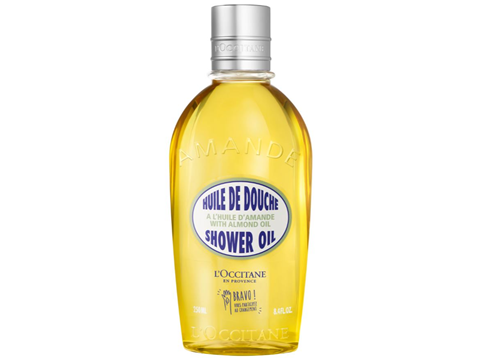
Carbios, L’Occitane en Provence, and Pinard Beauty Pack are packaging a shower oil from the L’Occitane Amande range in a transparent PET bottle made entirely from enzymatic recycling – a step towards the retailer’s target to produce all its retail bottles from 100% post-consumer recycled PET by 2027.
According to Carbios, the production process begins at its industrial demonstrator in Clermont-Ferrand. Hard-to-recycle waste like coloured bottles, multilayer trays, and mechanical recycling residues are collected, sorted, prepared, and sent to the facility, where the PET waste is depolymerized using Carbios’ biorecycling technology – leaving behind the original monomers, PTA and MEG.
These monomers are then intended to be repolymerized into new, fully recycled PET resins within European supply chains. In this case, Pinard Beauty Pack has blow-moulded them into bottles according to L’Occitane’s specifications at its facility in Oyonnax; L’Occitane has then filled the bottles with shower oil at its plant in Manosque.
Reportedly, utilizing the monomers within Europe makes Carbios’ technology more environmentally beneficial. Transport distances are thought to be reduced, while the end-of-life products can be put back into local collection and production processes – both of which are believed to improve the life cycle analysis (LCA) of each product.
Compared to virgin plastic production, enzymatically recycled plastic is said to reduce CO2 emissions by 57% and avoid 1.3 tonnes of oil for every tonne of recycled PET produced. The Ellen MacArthur Foundation’s Material Circularity Indicator also suggests that enzymatic recycling is five times more circular than conventional recycling processes.
Carbios believes that its ‘highly selective’ enzyme is complementary to mechanical recycling technologies, as it can apparently handle coloured, multilayer, and textile waste that cannot be recycled using conventional methods. The PTA and MEG monomers it produces are also set to produce food-safe PET packaging with identical qualities to petroleum plastics.
Now the company intends to replicate its partnership with L’Occitane en Provence and Pinard Beauty Pack in similar chains across the world to meet the needs of international brands.
“Carbios’ innovation accelerates the transition to a circular economy by offering an alternative to petro-sourced PET and a circular PET recycling solution that reduces CO2 emissions by 57%,” commented Carbios CEO Emmanuel Ladent. “But to create an efficient recycling sector, all players in the value chain have their part to play, and must work together.
“The long-term partnership between Carbios and L’Occitane is testament of this shared desire to promote more responsible consumption. The bottle produced with L’Occitane and its converter Pinard illustrates how the industry is moving forward.”
David Bayard, R&D packaging director at L’Occitane, continued: “At L’Occitane en Provence, we’re Cultivators of Change, and we’re proud to be part of this forward-looking industry.
“Today, just over 50% of our PET material is from recycled origin. Thanks in particular to CARBIOS and depolymerization technologies, we will be able to reach 100% by 2027 for all our retail bottles.
“We are very satisfied with the quality of the bottle produced in collaboration with CARBIOS and Pinard, which enables us to reduce our reliance on fossil-based plastic and offers a viable alternative with equivalent quality and transparency, which is important to showcase our products.”
Paolo Coelho, plant director at Pinard Beauty Pack, added: “At Pinard, we are delighted to have reached this new milestone and to be associated with the production of L’Occitane en Provence’s first bottle using Carbios’ revolutionary technology.
“This bottle was blow-moulded under the same conditions and with the same parameters as virgin or mechanically recycled PET, a considerable advantage for the deployment of Carbios’ technology. We’re seeing strong demand for high-quality recycled PET which can be used to produce the same applications as with virgin PET.”
The bottle will be showcased at Edition Spéciale by LuxePack at the Carreau du Temple in Paris on 4-5th June. Carbios will be present at Stand D02.
A Case Study conference – ‘Carbios and L’Occitane en Provence: technological innovation serving eco-design’ – will also take place in the Carreau du Temple’s auditorium on Wednesday 5th June from 15:00 to 15:45. Benedicte Garbil, senior VP Corporate Affairs & Sustainability at Carbios, and L’Occitane en Provence’s R&D packaging leader Martin Blondel are listed as speakers.
The news comes after Carbios and L’Oréal won a Pioneer Award for what was described as the ‘world’s first’ fully enzymatically recycled plastic bottle for cosmetics at the World Alliance Summit last year.
Since then, a groundbreaking ceremony has been held to begin the construction process for Carbios’ industrial-scale PET bio-recycling plant in Longlaville, which anticipates an annual capacity of 50,000 tons of prepared waste when operating at full capacity.
A supply agreement with Hündgen Entsorgungs is expected to secure 15kt of post-consumer PET flakes every year from late 2026, sourcing the plastic from light packaging waste in German household recycling streams; this is one of several partnerships Carbios has formed to access PET waste for its operations.
Other organizations have also looked into enzymes as a method of recycling. For example, scientists at King’s College London have harnessed an enzyme often found in biological laundry detergents to break down and recycle single-use bioplastics in pursuit of a circular system.
If you liked this story, you might also enjoy:
How are the top brands progressing on packaging sustainability?
The ultimate guide to global plastic sustainability regulation














No comments yet